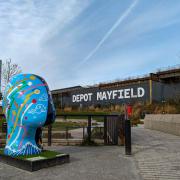As AstraZeneca moves its research and development out of Cheshire, a host of small companies are clamouring to move in to a new BioHub on the same site.
When AstraZeneca announced that research and development at Alderley Park would stop, and 1,600 jobs would be relocated to Cambridge by 2016, it seemed as if a black cloud hung over this well-to-do corner of Cheshire.
If there was a silver lining, it was the announcement that a BioHub – a new centre for bioscience companies - would be established at Alderley Park by BioCity Nottingham Ltd, which for ten years has been an incubator for new life sciences businesses, helping them grow and foster useful partnerships.
But can an enterprising network of smaller companies fill the gap to be left in the local economy by a giant such as AstraZeneca? If anyone should know, it is Dr Glenn Crocker, chief executive of BioCity Nottingham Ltd.
‘My sense is that it will remain a big employment site,’ he says. ‘There’s a lot of people want to see it as such, so there should not be a huge detrimental impact. In fact, if it does develop as a site with small companies on it, it could have more people working on the site because smaller companies will actually cram people in more per square foot than the larger companies. You could end up with more employment.’
BioHub’s first three tenant firms are already installed at Alderley Park; Blueberry Therapeutics Ltd, Imagen Biotech Ltd and Redx Anti-Infectives Ltd. Dr Crocker says there is ‘a lot of interest’ from other companies wanting to join the BioHub.
The prime mover behind the BioHub was AstraZeneca itself. Clive Morris, the firm’s vice president, research and development says he is confident that with BioCity’s experience, investment can be attracted which will ‘build on the existing world class facilities available at Alderley Park.’
Dr Crocker says: ‘Big pharmaceutical companies like AstraZeneca and GSK and others are really keen on innovation and new technologies and new products coming through. A lot of that innovation comes from these small companies, as well as from their own internal R&D function, of course. A lot of companies want the benefits of the skills and experience available on the AstraZeneca site. So it becomes quite a symbiotic relationship. AZ gets, potentially, access to innovation and entrepreneurship and the companies get access to the skills and facilities that AZ has got.’
AstraZeneca’s research at Alderley Park in recent decades has yielded a number of anti-cancer treatments and the development of beta-blocker drugs. Dr Crocker expects that new companies coming to BioHub will also be seeking treatments for big social ills such as cancer and Alzheimer’s disease.
Other companies, contract research organisations, will move in to offer outsourced services to the innovators.
‘For example, a small company developing a new drug has to go through a whole series of steps in order to get it into clinical trials,’ says Dr Crocker. ‘Before it gets into humans, it has to be formulated into the right form to be taken as an injection or a tablet. A small company would not have the resources to do that in-house so would outsource that work to a specialist group who would turn that interesting molecule into a tablet or a powder.’
The future is one in which Big Pharma will increasingly outsource work to ‘fleet of foot’ smaller companies, Dr Crocker predicts.
When AstraZeneca announced plans to pull research and development out of Alderley Park in favour of a new £330m base in Cambridge, it was characterised as a brain drain from the north. Is it possible, though, that some of those AstraZeneca scientists may leave the company but stay at Alderley Park, as part of new enterprises at the BioHub?
‘Yes that’s definitely a possibility,’ says Dr Crocker. ‘There will be people being made redundant who may have thought for some time that they’ve had an idea they wanted to pursue. This could be just the impetus needed to develop that. We see it as positive news in that there’s somewhere for those people to go.
‘Firstly, they don’t even need to move to another location to work. Secondly, they can build up their business opportunities on their own and BioCity will help them do that, because a lot of the people who have worked at AstraZeneca don’t necessarily have all the skill set and experience they need to develop a new start-up. We can help them with that.’

























![Stephen Webb [Frank-N-Furter], Richard Meek [Brad], Haley Flaherty [Janet] & cast](/resources/images/128x89/1x/17679473.jpg)
![Stephen Webb [Frank-N-Furter], Richard Meek [Brad], Haley Flaherty [Janet] & cast](/resources/images/180x180/1x/17679473.jpg)
